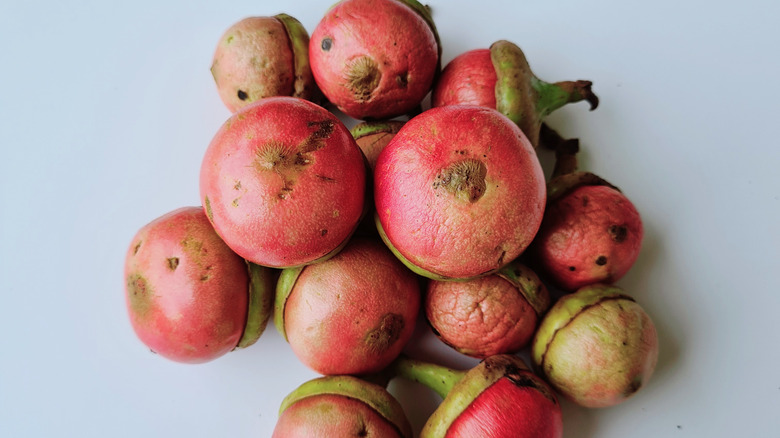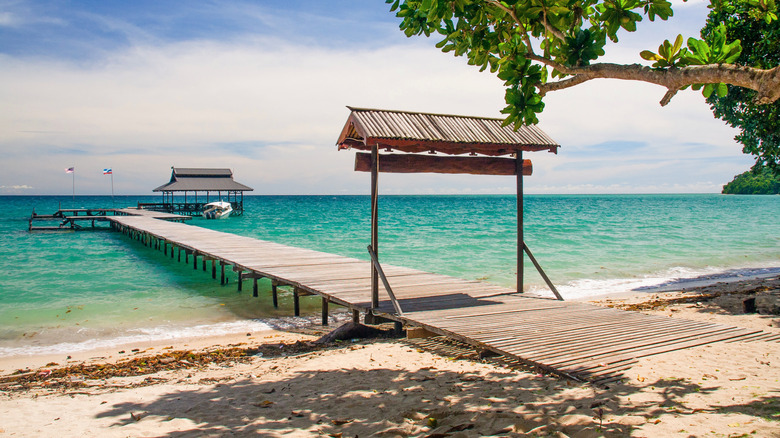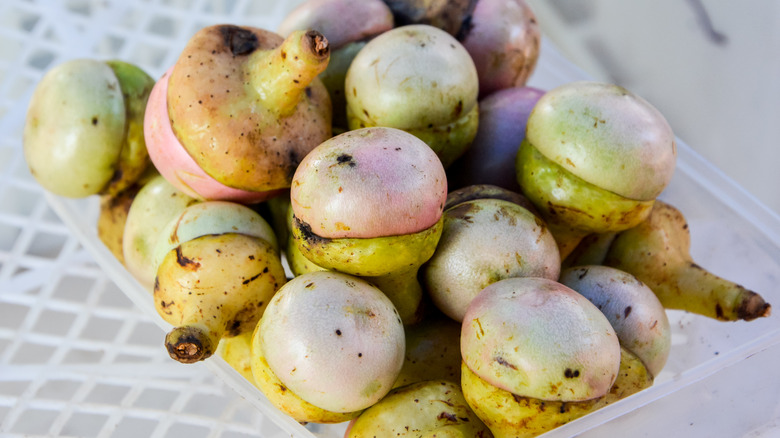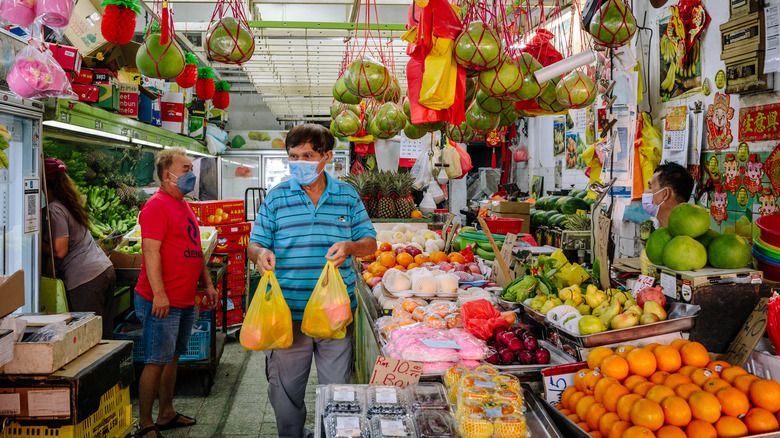Borneo's Pink Engkalak Fruit Is Like A Tangy, Decadent Avocado
You've all heard of avocados — but what about its distant Southeast Asian relative, the engkalak? Walking through the local markets of countries like Taiwan, Malaysia, Indonesia, and the Philippines, you're bound to come across many tropical fruits you've never seen or heard of. The engkalak (Litsea garciae), however, is especially rare. Native to the Malaysian Peninsula — on the island of Borneo, specifically — Specialty Produce claims that the small, bright pink fruits have helped sustain indigenous tribes since ancient times.
Known for its beaches and ancient rainforests, the engkalak, also called engkala, have thrived wildly within the tropical climates of Borneo island — the third largest island in the world, behind Greenland and New Zealand (per Britannica). Nicknamed the "Borneo avocado" (via Atlas Obscura), all along the island's northwestern coast, the fruit can be seen growing in clusters along the branches of evergreen trees that are as tall as 26 feet.
The Iban people have harvested engkalak from the wild for over 400 years, but since then, word has spread about these rare, indigenous fruits. And Americans' growing interest in tropical fruits like the dragonfruit and India's jackfruits could mean big things for avocado's tangier, more decadent relative, the engkalak.
What is an engkalak?
Being native to the area, engkalak is most commonly found in food markets around Borneo. However, according to Specialty Produce, they can also be seen in specialty stores and markets across Malaysia, Taiwan, the Phillippines, Indonesia, and China. Depending on their ripeness, engkalak can range in color from light green to bright reddish pink — the latter being the point at which they're edible. Round and small, engkalak have smooth skin and a cute green cap that is easily removed. Their flesh ranges in color from pale green to white, and they have a rich and creamy texture.
Like avocados, their skins and the large brown seed in the middle of the fruit are inedible; the only edible part of the engkalak is its creamy flesh. When ripe, Freezer Ninja describes engkalak as having a somewhat sweet taste — similar to the mild taste of an avocado, but with an even creamier flavor. The flesh of the engkalak looks like soft white cheese and is said to taste like buttermilk or sour cream; hence, one of its many nicknames is the "butter fruit."
Preparing engkalak
While they aren't typically eaten raw, if the engkalak is ripe enough, Specialty Produce says you can simply press a spoon along the sides of the fruit and roll it between your hands to soften it. The stem should then be easily removed from the top of the fruit, revealing the creamy flesh. Then, with a light squeeze, the flesh will flow out of the fruit, popping the seed out along with it.
To consume engkalak, according to Atlas Obscura remove the stems from the tops, and soften them either by submerging them in a bowl of hot water or coating them in a salt mixture. After a few minutes, they may have lost their beautiful pink color, but they'll be much softer for it, allowing you to effortlessly squeeze out the flesh. At that point, the engkalak can be eaten as is — however, a sprinkle of salt is strongly encouraged. Traditionally in Borneo, the engkalak is served this way along with a topping of crunchy sago seed, eaten for lunch with hot rice, or pickled and preserved for use throughout the off-season.
Given its milky flavor, Atlas Obscura foresees engkalak being used as a plant-based dairy substitute — think of engkalak-based alternative milk and plant-based cream cheese.
Where to buy engkalak
Being a rare fruit, you can probably imagine how difficult it can be to get your hands on engkalak if you live outside the Malaysian islands. Even if you travel to Southeast Asia, if your goal is to get a taste of one, you'll need to plan carefully, as they are only in season during the fall or early winter.
Thankfully, however, there are other ways you can try engkalak. Today many delivery services such as Misfits Market, Miami Fruit, and Fruit Hunters bring rare, tropical fruits straight to your door — still, what you get, as ever, depends upon the season. You may have more luck shopping on sites like Umami Cart, an online market that carries specialty Southeast Asian fruits, during the fall and early winter. Otherwise, some Etsy shops sell engkalak seeds if you have a green thumb. So if you live in a tropical area, you may want to harvest them on your own.
Nutritional information
Being so rare, the nutritional benefits of engkalak aren't widely known. But, by belonging to the same family as avocados — one of the two fruits with the highest amount of protein per cup — engkalaks automatically get some cool points in the health food world. Specialty Produce claims that engkalaks are a beneficial source of potassium, vitamin C, fiber, calcium, and iron. They're also full of other nutrients like manganese, phosphorus, zinc, magnesium, and copper — not to mention powerful, cell-protecting antioxidants.
A 2021 scientific paper published in the journal "Malaysian Applied Biology," investigates the chemical compositions and pharmacological properties of the fruit. And its findings support the presence of the nutrients mentioned but go on to show that, depending on size, the engkalak flesh can contain as much as 2.5 a half grams of protein, 7 grams of fat, and 10-22 grams of carbs, and a total of around 100 calories.




